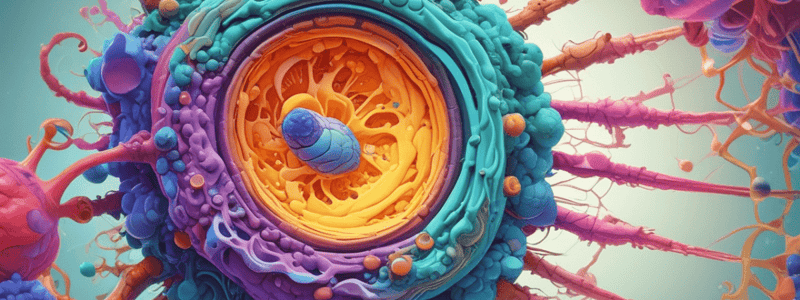Podcast
Questions and Answers
Which organelle is responsible for producing energy through photosynthesis?
Which organelle is responsible for producing energy through photosynthesis?
- Endoplasmic reticulum
- Golgi apparatus
- Chloroplasts (correct)
- Mitochondria
What process generates gametes (sex cells) with half the genetic material of the parent cell?
What process generates gametes (sex cells) with half the genetic material of the parent cell?
- Meiosis (correct)
- Protein synthesis
- Mitosis
- Cell division
Which biological process involves organisms changing over time due to natural selection and genetic drift?
Which biological process involves organisms changing over time due to natural selection and genetic drift?
- Evolution and Adaptation (correct)
- Ecology and Interactions
- Cell Division and Growth
- Genetics and DNA
Flashcards are hidden until you start studying
Study Notes
Understanding Biology
Biology is a natural science concerned with the study of living organisms and their interactions with the environment. It encompasses various fields, including botany (the study of plants), zoology (the study of animals), and microbiology (the study of microorganisms). This article aims to provide an overview of the key concepts and topics within the field of biology.
Cellular Basics
At the core of all living organisms are cells, which are the fundamental unit of life. There are two main types of cells: prokaryotic (found in bacteria and archaea) and eukaryotic (found in multicellular organisms, including humans). The structure and functions of these cells vary significantly, with eukaryotic cells being more complex due to their compartmentalized organization.
Prokaryotic Cells
Prokaryotes have simpler structures, with no nucleus or membrane-bound organelles. They often exist individually or form colonies. Examples include Escherichia coli (E. coli), a common bacterium found in soil, water, and the human digestive tract.
Eukaryotic Cells
Eukaryotic cells, such as those found in plants and animals, are characterized by a nucleus enclosed in a nuclear envelope and various other membrane-bound organelles performing specific functions. Some key organelles include mitochondria (responsible for cellular respiration), chloroplasts (produce energy through photosynthesis), endoplasmic reticulum (ER; involved in protein synthesis), and Golgi apparatus (modifies proteins for transport out of the cell).
Biological Processes
Understanding biological processes is crucial for understanding how living organisms function and interact with their environment. Some essential processes include:
Cell Division and Growth
Cell division occurs through mitosis and meiosis. Mitosis produces identical daughter cells, while meiosis generates gametes (sex cells) with half the genetic material of the parent cell. Both processes are vital for growth, development, and reproduction.
Genetics and DNA
Genetics is the study of hereditary traits passed down through generations. Deoxyribonucleic acid (DNA) carries genetic information, encoding instructions for protein synthesis. Understanding genetics helps us grasp how traits are inherited and how mutations can lead to genetic disorders.
Evolution and Adaptation
Evolution is the process by which organisms change over time due to natural selection and genetic drift. Organisms adapt to their environment through various mechanisms, such as genetic variation, gene flow, and mutation, leading to speciation (the formation of new species) and adaptation to changing ecological conditions.
Ecology and Interactions
Ecology studies the relationships between living organisms and their physical environment. It explores topics such as population dynamics, competition, predation, symbiosis, and community structure. Understanding these interactions is crucial for managing ecosystems sustainably and preserving biodiversity.
Conclusion
Biology is a vast field that encompasses diverse aspects of life, from molecular processes within cells to complex interactions between organisms and their environments. By understanding these concepts, we gain insight into the fundamental workings of nature and develop strategies to protect and conserve our planet's biodiversity.
Studying That Suits You
Use AI to generate personalized quizzes and flashcards to suit your learning preferences.




